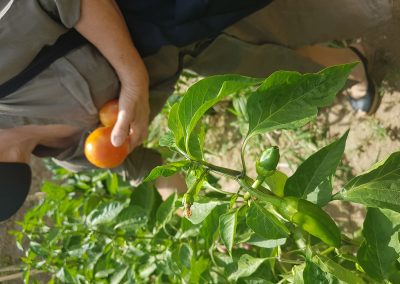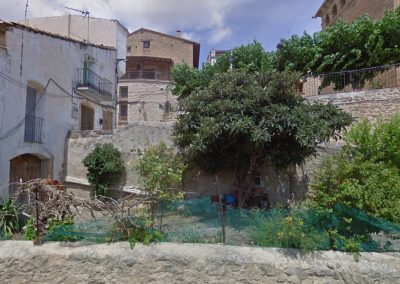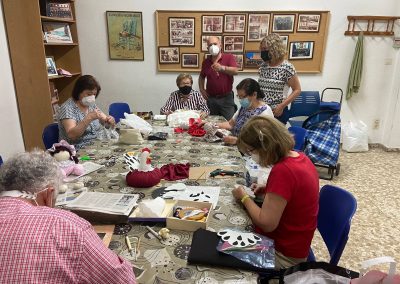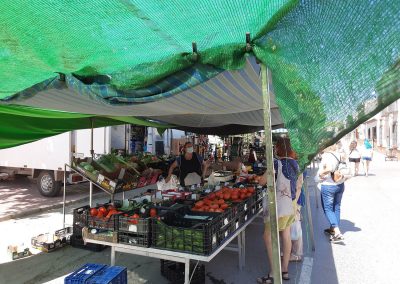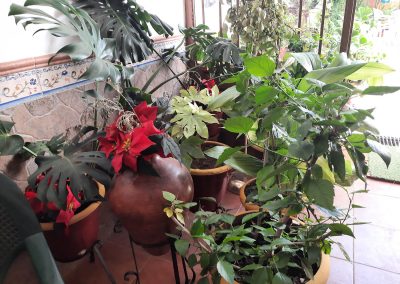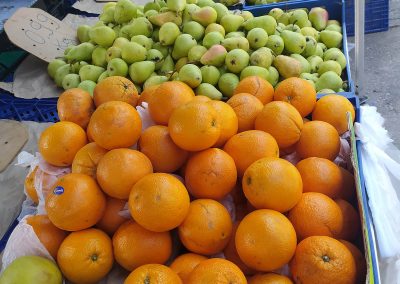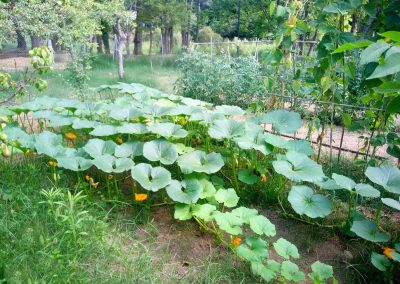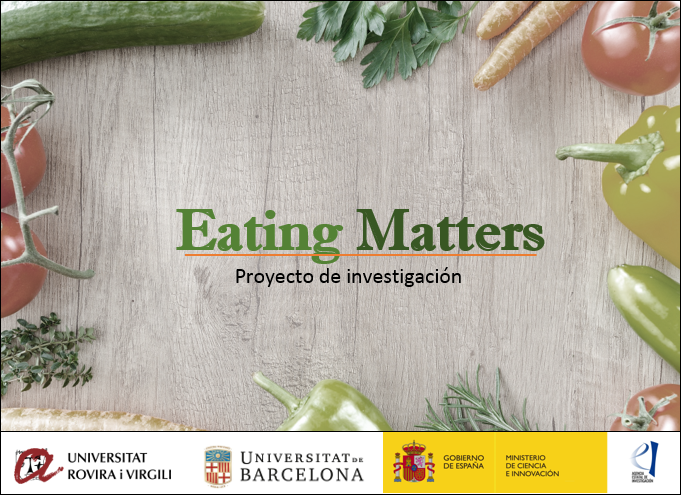
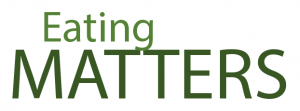 The main objective of this coordinated project is to give an answer to the challenges faced by Spanish society and its institutions in their attempt to achieve fairer, healthier and more sustainable food systems in a context that is far from being politically and socioeconomically stable. A context where life precariousness is having an impact on the increase of social inequalities and the worsening of living conditions for the most vulnerable persons.
The main objective of this coordinated project is to give an answer to the challenges faced by Spanish society and its institutions in their attempt to achieve fairer, healthier and more sustainable food systems in a context that is far from being politically and socioeconomically stable. A context where life precariousness is having an impact on the increase of social inequalities and the worsening of living conditions for the most vulnerable persons.
Our research falls within Challenge 6 of “Social Sciences, Humanities and Natural Sciences With and For Society” (and linked to Challenge 1, “Health, Demographic Change and Well-being”, and Challenge 2, “Food Quality and Safety”), and its main goal is to help transforming social and economic policy to tackle ageing and demographic change, social exclusion and poverty, as well as to promote healthy and sustainable lifestyles.
Since an approach to food (in)security is only contemplated in a fragmented way in Spanish political and social agendas, this research considers a holistic approach. This places at the centre of the debate the different types of food insecurity coexisting today, their nature and scope, and, particularly, how they manifest themselves, in one of the groups with the greatest demographic weight and one of the most vulnerable: the elderly.
Since this project focuses on economic and socio-cultural factors limiting people’s equitable access to one of the basic requirements for subsistence, we will analyse the unequal impact that the gender system has on the different forms of food insecurity (accessibility and harmlessness) and their health effects.
The objective of the two subprojects conforming this research is to discover the food (in)security problems that, since they affect the elderly, need to be solved urgently.
Coordinated by: MARC -Universitat Rovira i Virgili
Granted by: Ministerio de Ciencia e Innovación (Project I+D+i – Retos – Coordinated. Subproject 2. Code: PID2019-104253RB-C22)
Call: Programa estatal de I+D+I orientada a los retos de la sociedad. Ministerio de Ciencia e Innovación.
Project code: EIN2020-112290
Period: June 2020 – May 2024

SUBPROJECTS
Subproject 1
Precarization and (un)secure food itineraries in later life
Further information about Eating Matters’ Subproject 1: “Precarization and (un)secure food itineraries in later life” developed by Universitat Rovira i Virgili here.
Subproject 2
Environmental risks and dietary uncertainties in later life
This subproject, developed by Universitat de Barcelona, will examine those aspects of food itineraries that condition and/or determine whether the diet of older people is more or less healthy and environmentally sustainable, taking into account their diversity in terms of gender, social class, family structure and place of residence (rural/urban).
The sustainability of diets, according to the 2030 Agenda SDGs, goes beyond ensuring the nutritional or biological safety of food, requiring the improvement of economic and socio-cultural aspects of food, in order to bring about a new food transition. In this regard, the aim is to analyse food practices that put the health of the elderly at risk when they don’t have access to safe food, in harmless conditions both nutritionally and environmentally.
The project will also explore whether the absence of establishments with a diversity of affordable and healthy food in the living environment of the elderly increases these forms of food insecurity. Similarly, the aim is to analyse how the food risk and the uncertainties of the exposure to persistent toxic substances are perceived, to the extent that the elderly are more vulnerable to possible harmful effects, compromising their chances to grow old in a healthy way. It will also examine social initiatives of citizen participation that promote healthier and more sustainable food practices, as well as alternative proposals to achieve food security alongside or independently of the agribusiness models. Lastly, It will compare how laypersons and experts perceive nutritional and environmental risks, looking at factors such as trust/distrust, attitudes, and different forms of communicating and educating about food risks.
Mabel Gracia-Arnaiz
Principal Investigator – Subproject 1
Professor at the Department of Anthropology,
Philosophy and Social Work, Universitat Rovira i Virgili.
Cristina Larrea-Killinger
Principal Investigator – Subproject 2
Professor at the Department of Social Anthropology, Universitat de Barcelona.
THE TEAM
Universitat Rovira i Virgili
Subproject 1
Research team URV
Mabel Gracia (Principal Investigator, U. Rovira i Virgili) mabel.gracia@urv.cat
Lina Casadó (U. Rovira i Virgili) linacristina.casado@urv.cat
Blanca Deusdad (U. Rovira i Virgili) blanca.deusdad@urv.cat
Montserrat García (U. Ramon Llull) ratgo_@hotmail.com
Elena Requena (U. Ramon Llull) erequena@peretarres.org
Oriol Romaní (U. Rovira i Virgili) oriol.romani@urv.cat
Work team URV
Agustí Andreu (U. Rovira i Virgili) agusti.andreu@urv.cat
Anna Batet (U. Rovira i Virgili) anna.batet@amicsiamigues.urv.cat
Núria Borrell (U. Rovira i Virgili) nuria.borrellsole@gmail.com
Mireia Campanera (U. Rovira i Virgili) mireia.campanera@urv.cat
Flavia Demonte (U. Nacional San Martín) flaviademonte@yahoo.com.ar
Mercè Gasull (U. Rovira i Virgili) mmgasull@gmail.com
Marc González (U. Rovira i Virgili) marc.gonzalez@urv.cat
Virginia Henriques Calado (U. de Lisboa) vmcalado@ics.ulisboa.pt
Thalita Kalix (U. Rovira i Virgili) thalita.kalixgarcia@urv.cat
Ricardo A. Moreno (U. Rovira i Virgili) ricardoandres@gmail.com
Héctor M. Vásquez (U. Rovira i Virgili) hectormanuel.vasquez@estudiants.urv.cat
Universitat de Barcelona
Subproject 2
Research team UB
Cristina Larrea (Principal Investigator, U. de Barcelona) larrea@ub.edu
Miguel Company (U. de Almería) mcm107@ual.es
Jordi Gascón (U. de Barcelona) jordigascon@ub.edu
Andrés Fontalba (U. de Málaga) andres.fontalba.sspa@juntadeandalucia.es
Maite Ojeda (U. de València) maria.t.ojeda@uv.es
Work team UB
Juan P. Arrebola (U. de Granada) jparrebola@ugr.es
Ruth Echeverría (Instituto de Investigación Sanitaria i+12, Madrid) ruth.ecor@gmail.com
Patricia Ferreira (CES, Coimbra) pat.ferreira@gmail.com
Claudia Juzwiack (U. Federal de Sao Paulo) claudia.juzwiack@unifesp.br
Oriol Larrea (U. de Barcelona) oriollarrea111@gmail.com
Claudia Magaña (U. de Barcelona) claudia.magana@ub.edu
Araceli Muñoz (U. de Barcelona) aracelimunoz67@ub.edu
Borja Núñez (U. de Málaga) bnborja.98@gmail.com
Claudia Soar (U. Federal de Santa Catarina) claudiasoar@hotmail.com
FIELD WORK
The research project Eating Matters has finished the field work in Andalusia, Catalonia and the Valencian Community. This work took place between the months of June and November 2021, with the participation of around 20 people, including researchers and support staff.
The field work consisted of carrying out research stays in different neighborhoods and municipalities of these three autonomous communities by territorial work teams. Throughout the stays in the field, each team conducted interviews with senior citizens, collecting their food diaries over five days. This was complemented with life stories from participants. To investigate the situation of the elderly population from other perspectives, interviews with key informants (experts, professionals in the social and health field, entities and activists) were conducted, and discussion groups were organized.
The choice of the neighborhoods and municipalities where the field work was carried out took into account the research objectives and heterogeneity criteria based on social, demographic and environmental characteristics.
Andalusia
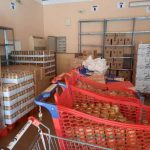 The work team carried out a research stay in the municipality of Humilladero (Málaga) and in the city of Granada during the months of June and July 2021. Humilladero is a town with more than 3000 inhabitants with a very aging population and the Zaidín-Vergeles neighborhood in Granada is the most populous in the city, showing strong economic inequalities among its neighbors.
The work team carried out a research stay in the municipality of Humilladero (Málaga) and in the city of Granada during the months of June and July 2021. Humilladero is a town with more than 3000 inhabitants with a very aging population and the Zaidín-Vergeles neighborhood in Granada is the most populous in the city, showing strong economic inequalities among its neighbors.
Catalonia
 The field research was carried out in three areas: the city of Barcelona (three neighborhoods), the city of Tarragona and different municipalities in the regions of Tarragonés, Terra Alta, Ribera d’Ebre and Priorat. Specifically in areas with a high rate of aging population. In Catalonia, the field research process was developed from June to November, 2021.
The field research was carried out in three areas: the city of Barcelona (three neighborhoods), the city of Tarragona and different municipalities in the regions of Tarragonés, Terra Alta, Ribera d’Ebre and Priorat. Specifically in areas with a high rate of aging population. In Catalonia, the field research process was developed from June to November, 2021.
Valencian Community
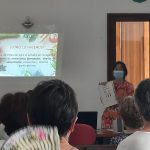 The project was presented on July 2nd, 2021, in the municipality of Teresa (Castellón), a town with approximately 250 inhabitants. The field work in different neighborhoods in the city of Valencia took place during November 2021.
The project was presented on July 2nd, 2021, in the municipality of Teresa (Castellón), a town with approximately 250 inhabitants. The field work in different neighborhoods in the city of Valencia took place during November 2021.
NEWSLETTERS
2022
Newsletter January-February 2022
Newsletter March 2022
Newsletter April 2022
2021
Newsletter July 2021
Newsletter August 2021
Newsletter September 2021
Newsletter October 2021
Newsletter November 2021
Newsletter December 2021
CONFERENCES & CONGRESSES
2024
23 –26.07.2024 | Congress. 18th EASA Biennal Conference. Doing and Undoing with Anthropology. Oral communication: Social perceptions of elderly people about food safety in Spain: Risks and Uncertainties. Authors: Cristina Larrea-Killinger (UB), Araceli Muñoz (UB), Mabel Gracia-Arnaiz (URV). (Panel P134: Food realities: discourses, practices, and food initiatives under transformation [Anthropology of Food Network]). Universitat de Barcelona (Spain).
09 –12.07.2024 | Congress. 10º Congreso Internacional de Antropología AIBR: Inteligencia Antropológica. Crisis sanitaria ayuda alimentaria y redes de apoyo en España: experiencias y narrativas sobre (in)seguridad alimentaria entre persones mayores en situación de precarización. Oral communication by: Mabel Gracia-Arnaiz, URV; Cristina Larrea-Killinger, UB. Universidad Complutense de Madrid (Spain).
01 –04.07.2024 | Congress. II Congreso Internacional de Antropología Feminista. En la calle y en la academia imaginando presentes en común. Coordination of symposium 9 “Antropología Feminista de la Salud” by Maribel Blázquez (UCM); Nuria Romo (UG); Cristina Larrea-Killinger (UB). Universidad de Granada (Spain).
01 –04.07.2024 | Congress. II Congreso Internacional de Antropología Feminista. En la calle y en la academia imaginando presentes en común. Entornos alimentarios y criterios de confianza y desconfianza entre mujeres mayores de 65 años en España. Oral communication by Cristina Larrea-Killinger (UB), Araceli Muñoz (UB) and Claudia Ridel Juzwiak (UNIFESP). Universidad de Granada (Spain).
07 –08.03.2024 | Seminar. Comer importa: envejecimiento y desafíos alimentarios. Coordinadores: Virginia Calado (ICS, Lisboa); Mabel Gracia-Arnaiz (URV), Cristina Larrea-Killinger (UB). Instituto de Ciencias Sociais, Universidade de Lisboa (Portugal).
07 –08.03.2024 | Seminar. Comer importa: envejecimiento y desafíos alimentarios. O envelhecimento da população e a Segurança Alimentar e Nutricional no Brasil – Panorama e Políticas Públicas. Presentation by: Claudia Soar (UFSC, Brasil). Instituto de Ciencias Sociais, Universidade de Lisboa (Portugal).
07 –08.03.2024 | Seminar. Comer importa: envejecimiento y desafíos alimentarios. Prácticas alimentarias, (in)seguridad alimentaria y percepción del riesgo en personas mayores en Andalucía y Cataluña: experiencias y resultados preliminares del cuestionario EatingMatters Presentation by: Ruth Echeverría (i+12). Instituto de Ciencias Sociais, Universidade de Lisboa (Portugal).
07 –08.03.2024 | Seminar. Comer importa: envejecimiento y desafíos alimentarios. Percepciones sociales de las personas mayores acerca de la inseguridad alimentaria en España: riesgos e incertidumbres. Presentation by: Cristina Larrea-Killinger (UB). Instituto de Ciencias Sociais, Universidade de Lisboa (Portugal).
07 –08.03.2024 | Seminar. Comer importa: envejecimiento y desafíos alimentarios. Aproximación a las representaciones socioculturales sobre confianza y desconfianza en la alimentación entre las personas mayores no dependientes a través del análisis de dominios culturales. Presentation by: Araceli Muñoz (UB). Instituto de Ciencias Sociais, Universidade de Lisboa (Portugal).
24 –26.01.2024 | Congress. III Congrès Català d’Antropologia. Symposium “Realitats alimentàries en transformació: discursos, pràctiques, cossos, respostes, projectes i iniciatives alimentaris”, coordinated by Claudia Magaña (UB) and Cristina Larrea Killinger (UB). Oral communication: Confiança i desconfiança en l’alimentació entre les persones grans no dependents. Estudi sobre les representacions socioculturals a través de l’anàlisi dels dominis culturals. By: Cristina Larrea Killinger, Araceli Muñoz, Ruth Echeverria, Oriol Larrea-Vivés. Universitat de Lleida (Spain).
24 –26.01.2024 | Congress. III Congrès Català d’Antropologia. Symposium “Realitats alimentàries en transformació: discursos, pràctiques, cossos, respostes, projectes i iniciatives alimentaris”, coordinated by Claudia Magaña (UB) and Cristina Larrea Killinger (UB). Oral communication: Dones grans en els seus entorns alimentaris: estudi de cas a Andalusia. By: Cristina Larrea Killinger, Claudia Juzwiak. Universitat de Lleida (Spain).
2023
13 –15.09.2023 | Congress. XV Congresso Internacional em Direitos Humanos. Por uma justiça mais acessível e efetiva em defesa dos Direitos Humanos. Panelist in “Pensar e Agir com a Natureza: Direitos Humanos e catástrofes ambientais”. Presented by: Cristina Larrea-Killinger. Pensar e agir pelo direto a uma alimentação adequada, inclusiva e sustentável: os riscos na saúde pelo sistema alimentar atual e os desafios futuros. Universidade Federal de Tocantins. Palmas, Tocantins (Brazil).
05 –08.09.2023 | Congress. XVI Congreso Internacional de Antropoloxia. Non ha fronteiras? ASAEE 2023. Communication by: Cristina Larrea-Killinger. Contribuciones antropológicas a la investigación interdisciplinar sobre salud ambiental y tóxicos: riesgos, cuerpos y territorios. Universidade da Coruña, A Coruña (Spain).
05 –08.09.2023 | Congress. XVI Congreso Internacional de Antropoloxia. Non hai fronteiras? ASAEE 2023. Communication by: Cristina Larrea-Killinger; Araceli Muñoz; Mabel Gracia. El gusto y el olfato como criterios de advertencia del riesgo alimentario: confianza y desconfianza en los alimentos que consumen las personas mayores no dependientes en España. Universidade da Coruña, A Coruña (Spain).
2022
03 – 05.11.2022 | Conference. XX Semana de Antropologia – Reaprender o mundo: ambiente, saúde e alimentação. Opening invited conference “A persistência dos contaminantes ambientais: corpos e territórios”, by: Cristina Larrea-Killinger. Organizada pela Universidade Federal do Rio Grande do Norte, Natal (Brazil).
06 – 09.09.2022 | Congress. VIII Congresso de APA (Associação Portuguesa de Antropologia). Os novos anos 20: desafios, incertezas, resistências. Oral communication by: Gracia, M.; Larrea Killinger, C. ¿Las personas mayores comen “más saludable”? Determinantes sociales y formas de desigualdad en el consumo alimentario en España. Universidade de Évora (Portugal).
08 – 10.07.2022 | Congress. I Antropología Feminista Kongresua: Transformando el conocimiento, habitando la incomodidad. Coordination of the panel Antropologia feminista de la salut: Maribel Blázquez, Cristina Larrea-Killinger, Nuria Romo. Universidad del País Vasco, Donosti (Spain).
08 – 10.07.2022 | Congress. I Antropología Feminista Kongresua: Transformando el conocimiento, habitando la incomodidad. Oral communication by: Cristina Larrea-Killinger, Araceli Muñoz. Riesgos e incertidumbres con género: la exposición de contaminantes ambientales durante el embarazo y la lactancia. Universidad del País Vasco, Donosti (Spain).
27 – 29.01.2022 | Congress. II Congrés Català d’Antropologia COCA. Oral communication by Cristina Larrea Killinger and Mabel Gracia: “Aprovisionamiento de alimentos durante la pandemia de COVID en España por parte de las personas mayores. Girona (Spain). Further information here.
2021
22 – 23.6.2021 | Symposium. 7th BSA Food Study Group Conference: Food & Food Systems in a time of Insecurity. Communications by Mireia Campanera, Lina Casadó, Mabel Gracia and Rat Garcia: 1) “Managing food assistance in the city of Barcelona: food itineraries, gender and health” 2) “Food aid in Spain: right to food, waste reduction, and market surplus beyond Covid-19”. Further information here.
18.6.2021 | Panel discussion. ISCo 10 años: Construyendo en el presente. With the participation of Mabel Gracia in the panel dIscussion: “Bueno para vender antes que bueno para comer”. Instituto de Salud Colectiva. ISCo-UNLa. Argentina. Watch the video here.
16.6.2021 | Virtual seminar. Debats des de l’Antropologia i el Treball Social: Alimentació, reagrarització i patrimonializació. Social Anthropology Group, Universitat Rovira i Virgili. With the participation of: Marc González: “Reagrarización y acceso a la tierra: un análisis de los Bancos de Tierra públicos en Catalunya.”; Mabel Gracia: “Precarización de la vida cotidiana: inseguridad alimentaria, género y salud”; Agustí Andreu: “La intervención del patrimonio en la mercantilización de los productos locales”. Further information here.
10.6.2021 | Conference. Biennal Ciutat i Ciència 2021. Ajuntament de Barcelona. With the participation of Mabel Gracia in the panel discussion: “Desigualtats socials i alimentació: El cas de l’obesitat” . Watch the video here.
3.6.2021 | Congress. I Congreso Gastrosofía; Ciudades alimentadas. With the participation of Mabel Gracia in the panel discussion: “Innovación, bienestar común: Modelos y fórmulas para hacer más permeable la relación entre sistema alimentario y ciudadanía”. Asociación La Plasita. Real Fábrica de Artillería de Sevilla. Watch the video here.
13-14.5.2021 | Symposium. Vº Col·loqui MARC. Diàlegs sobre (in)seguretat alimentària: precarització, risc i sostenibilitat. Organizing Committee: Mabel Gracia, Mireia Campanera, Cristina Larrea and Deborah Bekele (MARC). Presentations by: Mabel Gracia, Lina Casadó, Araceli Muñoz, Claudia Magaña, Cristina Larrea and Juan Pedro Arrebola. Panel coordination by: Rat Garcia, Mireia Campanera, Maria Clara Prata. Further information here.
1.2.2021 | Congress. XV Congreso de Antropología ASAEE. Oral communication by Lina Casadó and Mireia Campanera: “Ayudas alimentarias: entre la reducción del despilfarro y el derecho a la comida en contextos de precarización”. Further information here.
2020
23-28.11.2020 | Congress. VI Congreso de la Asociación Latinoamericana de Antropología. Desafíos emergentes: Antropologías desde América Latina y el Caribe. “Comer importa: desafíos para una alimentación saludable y sostenible en las personas mayores”, presentation by Mabel Gracia and Cristina Larrea-Killinger; “Las relaciones entre alimentación-salud-riesgo en tiempos de pandemia de COVID-19”, presentation by Cristina Larrea-Killinger, Amanda Barba, Maria Clara Prata Gaspar, Sara Anadon, Marta Ruíz and Arantza Beguería. Area 23, symposium 169: “Perspectivas socioculturales de los riesgos alimentarios y del comer saludable”, coordinated by: Maria Clara de Moraes Prata Gaspar, Ligia Amparo de Silva Santos, Ursula Vethein, Cristina Larrea-Killinger (Montevideo, virtual, 23-28/11/2020. Presentation: 24/11/2020). Further information here.
28.1.2020 – 1.2.2020 | Congress. I Congrés Català d’Antropologia. “Eating matters: challenges of a healthy and sustainable food in later life”, presentation by Mabel Gracia and Cristina Larrea Killinger. Symposium 13: “Incerteses del sistema alimentari”, coordinated by: Mabel Gracia and Cristina Larrea Killinger. Further information here.
PUBLICATIONS
2024
- Larrea-Killinger, C.; Muñoz, A.; Echeverría, R.; Larrea, O.; Gracia-Arnaiz, M. (2024). Trust and distrust in food among non-dependent elderly people in Spain. Study on socio-cultural representations through the analysis of cultural domains. Appetite, 197, 177306. https://doi.org/10.1016/j.appet.2024.107306.
2023
- Kouiti, M.; Ortega-Rico, C.; Arrebola, J.P.; Gracia-Arnaiz, M.; Larrea-Killinger, C. (2023). Demographic and Socioeconomic Factors Associated to Fruits and Vegetables Consumption in Elderly Europeans: A Systematic Review. Int J Environ Res Public Health 20(4):3442.
2022
- Gracia-Arnaiz, M.; Larrea-Killinger, C (2022). Comer importa: los desafíos de una alimentación inclusiva, saludable y sostenible para un mejor envejecimiento. Revista d’etnologia de Catalunya, 24, 235-237.
2021
- Carter Anand J.; Donnelly, S.; Milne, A.; Nelson-Becker, H.; Vingare, E.; Deusdad, B. et al (2021). The Covid-19 Pandemic and Care Homes for Older People in Europe – Deaths, Damage and Violations of Human Rights. European Journal of Social Work.
- Company-Morales, M.; Zafra, E.; Casadó-Marin, L.; Alarcón, C.; Arrebola, J.P. (2021). Perception and Demands of Pregnant anf Breastfeeding Women Regarding Their Role as Participants in Environmental Research Studies. International Journal of Environmental Research and Public Health, 18(8).
- Durán Monfort, P.; Muñoz García, A.; Llobet Estany, M; Magaña-González, C.R. (2021). Alimentación y desigualdad en Barcelona: itinerarios de precarización y respuestas ante la crisis. Revista de Antropología Social, vol. 30 nº2. ISSN: 1988-2831.
- Gracia-Arnaiz, M.; Casadó, L.; Campanera, M. (2021). Con el hambre no se juega ¿o sí? Revista de Antropología Social, vol. 30 nº2. ISSN: 1131-558X.
- Gracia-Arnaiz, M.; Casadó, L.; Campanera, M. (2021). Introducción al monográfico: Antropología del hambre: La (in)seguridad alimentaria en contextos de precarización. Revista de Antropología Social, vol. 30 nº2. ISSN: 1988-2831.
- Gracia-Arnaiz, M.; García-Oliva, M.; Demonte, F. (2021). Retóricas del hambre en la prensa digital española (2015-2018): de penurias que vienen y se van. Revista de Antropología Social, vol. 30 nº2. ISSN: 1988-2831.
- Verthein, U.; Gaspar, M.C.M.P. (2021). Normativizando o comer: análise crítica de guias alimentares brasileiros e espanhóis no contexto da pandemia de COVID-19. Ciência & Saúde Coletiva, 26(4): 1429-1440.
- Verthein, U.; Gaspar, M.C.M.P. (2021). Género, precariedad y exclusión: experiencias de mujeres que utilizan comedores sociales. Revista de Antropología Social, vol. 30 nº2. ISSN: 1988-2831.
2020
- Aixelà, Y.; Larrea-Killinger, C. (2020). Retóricas de confinamiento postcovid19: dismovilidad, necropolítica y cuerpo. En: M.J. Buxó; J.A. González Alcantud (eds.) Pandemia y confinamiento: Aportes antropológicos sobre el malestar en la cultura global. Granada: Universidad de Granada, p.139-159.
- Arrebola, J.P.; Muñoz, A.; Ferrero, S.; Larrea-Killinger, C. (2020). Perceptions and Attitudes of Gynecologic and Pediatric Professionals Regarding Dietary Exposure to Chemical Pollutants. International Journal of Environmental Research and Public Health, 17(11): 3946.
- Beguería, A.; Gaspar, M.C.M.P.; Ruiz, M.; Martínez, A.B.; Anadón, S.; Larrea-Killinger. C. (2020). Alimentación, salud y riesgo en tiempos de pandemia por COVID-19. En: Evangelidou, M., Martínez-Hernáez, A. (eds.), RESET: Reflexiones antropológicas ante la pandemia de COVID-19. Tarragona: Publicacions URV, p.125-127.
- Casadó-Marín, L.; Gracia-Arnaiz, M. (2020) “I’m fat and proud of it”: Body size diversity and fat acceptance activism in Spain, Fat Studies, 9:1, 51-0.
- Deusdad, B. (2020). COVID-19 and Nursing Homes ‘ crisis in Spain. Ageism and Scarcity of Resources, Research on Ageing and Social Policy 8(2), 142-168.
- Fontalba-Navas, A.; Zafra-Aparici, E.; Prata-Gaspar, M.C.P.; Herrera-Espejo, E.; Company-Morales, M.; Larrea-Killinger, C. (2020). Motivating Pregnant and Breastfeeding Women in Spain to Avoid Persistent Toxic Substances in Their Diet. International Journal of Environmental Research and Public Health. 17(23): 8719.
- Gascón, J. (2020). COVID-19, estado de emergencia y agricultura familiar en España: mercados campesinos en Barcelona y huertos de autoconsumo en Alcaine (Teruel). Ager: Revista de Estudios sobre Despoblación y Desarrollo Rural, 30: 177-206.
- Gaspar, M.C.M.P.; Muñoz, A.; Larrea-Killinger, C. (2020). How would you define healthy food? Social representations of Brazilian, French and Spanish dietitians and young laywomen. Appetite, 153, 104728.
- Gaspar, M.C.M.P.; Ruiz, M.; Beguería, A.; Anadón, S.; Barba, A.; Larrea-Killinger, C. (2020). Comer en tiempos de confinamiento: gestión de la alimentación, disciplina y placer. Perifèria: revista de recerca i formació en antropologia, 25(2): 63-73.
- Gracia-Arnaiz, M.; Bom Kraemer, F.; Demonte, F. (2020) Acting against obesity: a cross-cultural analysis of prevention models in Spain, Argentina and Brazil, Critical Reviews in Food Science and Nutrition.
- Gracia-Arnaiz, M.; Demonte, F.; Kramer, F. (2020) Prevenir la obesidad en contextos de precarización: respuestas locales a estrategias globales. Salud Colectiva, 16-27 Universidad Nacional de Lanus.
- Larrea-Killinger, C.; Muñoz, A.; Beguería, A.; Mascaró-Pons, J. (2020). Body Representations of Internal Pollution: The Risk Perception of the Circulation of Environmental Contaminants in Pregnant and Breastfeeding Women in Spain. International Journal of Environmental Research and Public Health, 17, 6544.
- Larrea-Killinger, C. (2020). «Conferencia inaugural. Cuerpos futuros: contaminación interna y sufrimiento ambiental». En: Colangelo, A.; Cantore, A.; Weingast, D.; Pozzio, M.; Lorenzetti, M.; Monaco, R.; Castilla, V. (comp.) (2020) Trayectorias antropológicas y trabajo en salud. Diálogos, intersecciones y desafíos. II Jornadas de la Red de Antropología y Salud en Argentina. (pp. 27-42). RedAsa: Buenos Aires. ISBN: I978-987-86-6918-2.
- Llobet, M.; Durán, P.; Magaña CR.; Muñoz, A; Piola, E. (2020). Introducción al monográfico “Précarisation alimentaire, résistances individuelles et expériences pratiques: regards locaux, régionaux, transnationaux”. Anthropology of Food, S15.
- Llobet, M.; Durán, P.; Magaña CR.; Muñoz, A; Piola, E. (2020). Précarisation alimentaire et bien-être: réponses et pratiques pour lutter contre l’insécurité alimentaire à Barcelone. Anthropology of Food, S15.
- Zafra, E.; Casadó, L.; Company, M. (2020). Escenarios urbanos y subjetividades en la construcción de discursos y prácticas sobre cuerpo, género y alimentación. Una etnografía alimentaria sobre mujeres embarazadas y lactantes en España. Menezes, D. et al. Consumos alimentares em cenários urbanos: múltiplos olhares. Universidade do Estado de Rio de Janeiro: Rio de Janeiro.
2019
- Casadó, L.C.; Arrebola, J.P.; Fontalba, A.; Muñoz, A. (2019). Adverse effects of hexaclorobenzene exposure in children, Environmental Research, 176: 108421.
- Fàbregas, M.; Fabrellas, N.; Larrea-Killinger, C. (2019). Fuentes de información alimentaria que utilizan las mujeres embarazadas y lactantes. Matronas Profesión, 20(1): 23-29.
- Gaspar, M.C.M.P.; Verthein, U. (2019). Entre la “salud” y la “tradición”: las representaciones sociales de la Dieta Mediterránea, Physis Revista de Saude Coletiva, 29(2).
- Gracia-Arnaiz, M. (2019) Eating outside the home: food practices as a consequence of economic crisis in Spain. Collinson, P et al. Food and sustainability in the Twenty-first Century. Cross-disciplinary perspectives, Oxford, Berghahn Books.
- Larrea-Killinger, C.; Freitas, M.C.S.; Rêgo, R.C.F. (2019). Reima: Proibição de alimentos em comunidades de pescadores na Bahia, Brasil. Revista de Alimentação e Cultura das Américas, 1(1): 46-71.
- Larrea-Killinger, C.; Muñoz, A.; Beguería, A.; Mascaró, J. (2019). «Como un sedimento que se va quedando en el cuerpo»: Percepción social del riesgo sobre compuestos tóxicos persistentes y otras sustancias químicas sintéticas en la alimentación entre mujeres embarazadas y lactantes en España. Revista de Antropología Iberoamericana, 14 (1): 121-144.
- Muñoz, A.; Fontalba-Navas, A.; Arrébola, P.; Larrea-Killinger, C. (2019) Trust and distrust in relation to food risks in Spain: An approach to the socio-cultural representations of pregnant and breastfeeding women through the technique of free listing, Appetite, 141, 104365.
2018 and before
- García-Oliva, M. (2018). Transculturalidad y envejecimiento. El rol del adulto mayor en el seno de la familia. Revista de Investigación y Desarrollo, 9-15-14.
- Gascón, J. (2018). Comida no comida. Un análisis del desperdicio de alimentos desde la agroecología. En Observatorio de la Alimentación (ed.) Polisemias de la Alimentación: salud, desperdicio, hambre y patrimonio. (pp. 33-52). Barcelona: Edicions de la Universitat de Barcelona.
- Gascón, J. (2018). Food waste: a political ecology approach. Journal of Political Ecology, 25(1): 587-601.
- Gaspar, M.C.M.P.; Juzwiak, C., Muñoz, A.; Larrea-Killinger, C. (2018). Las relaciones entre salud y alimentación. Una lectura antropológica. En Observatorio de la Alimentación (ed.) Polisemias de la Alimentación: salud, desperdicio, hambre y patrimonio. (pp. 53-76). Barcelona: Edicions de la Universitat de Barcelona.
- Gracia-Arnaiz, M. (2017). Taking measures in times of crisis: The political economy of model prevention in Spain. Food Policy, 68, 65-76.
- Deusdad, B.; Ricco, I. (2018). Professional stakeholders’ views of the use of digital technologies in Spanish long- term care, Human Technology, 14(3), 2018-11, 382-403.
Mabel Gracia Arnaiz
Principal Investigator - Subproject 1
Professor at the Departament of Anthropology, Philosophy and Social Work, Universitat Rovira i Virgili.
Cristina Larrea-Killinger
Principal Investigator - Subproject 2
Professor at the Departament of Social Anthropology, Universitat de Barcelona.

